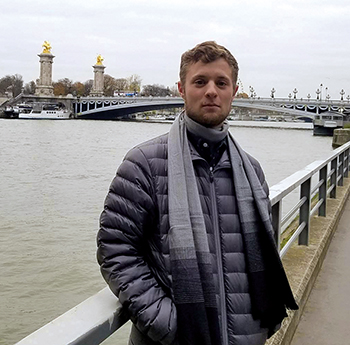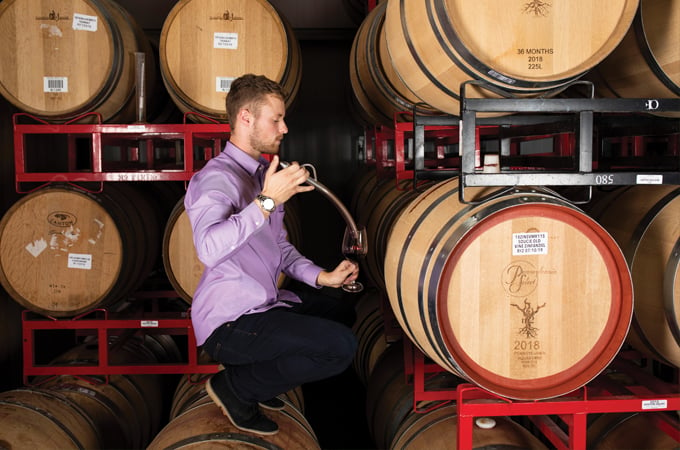When Nicholas (Nick) Burchett ’19 entered Redlands, his eye was set on medical school. He was recruited to the University, his brother’s alma mater, as a member of the University’s track and field team. “I chose Redlands because I fell in love with the sense of community and appreciated the small class size,” he says.
The biology major soon realized, however, that medicine wasn’t his calling and began to look for other ways to use his degree. A conversation with a winemaker at Markham Wines in Napa, who had also been a biology major, inspired him. “Taking grapes, fermenting them, and then aging them is such a scientific process, but also artistic in a way,” Burchett says. “When I learned that my biology degree would help me, I knew I wanted to pursue a career in winemaking.”
Burchett was also keen to hone his skills in French—a language he had studied in high school. With the encouragement of his advisor, Professor Frank Bright, he decided to spend a semester during his junior year in Nantes, a city on the Loire River in western France.
To get ready, Burchett took advantage of a class called Crossing Cultures: Pre-Departure, taught by Susan Goldstein, a U of R psychology professor. According to Goldstein, research shows that preparation is valuable to make the most of study abroad. In general, her message to students in her class is: “Learn as much as you can about the place you’re going, think about how you might experience life there, and plan. You want to be able to troubleshoot if you run into problems.”

Burchett, who had not traveled outside the country before, took the advice to heart. “The pre-departure course helped me anticipate how being a part of another culture and speaking another language would affect me psychologically,” he says. “And the post-trip course [also offered by Goldstein] was great, because it gave me a way to process my study abroad experience and understand how what I had learned in France could help me at Redlands and after graduation.”
During his time in France, Burchett confirmed his love of the French language and discovered a wellspring of confidence he didn’t know he had. “At one point, I had a bad bout of homesickness,” he recalls. “I decided I needed to remind myself why I went abroad, so one day after class, I took the water taxi across the river to another small town, sat in a café by the river, had a glass of wine, and watched the world go by. It grounded me, and I felt my homesickness dissipate. Apart from working on my language skills, I feel the semester abroad enabled me to become more independent.”
This kind of personal growth is often the outcome of international travel, according to Goldstein. “Students are generally more confident when they return home,” she says. “They’ve lived on their own, gotten lost, and found their way.” Goldstein also cites benefits such as an increase in creativity and the ability to tolerate ambiguity; in addition, “study abroad and diversity experiences have been linked to increased degree completion and retention, as well as greater emotional resilience.”
Today, Burchett serves as cellar master for M2 Wines in Acampo, California, tasked with managing all the Lodi vineyard’s wines in process. He is responsible for tasting the wines and making sure they’re aging well and getting ready to be bottled. The job seems like a perfect fit for a double major in French and biology. And Burchett believes his time abroad enhanced his ability to pursue the job of his dreams.
“Studying abroad is a great experience academically speaking, but it’s a bigger life experience,” he says. “It helps you grow as a person.”






